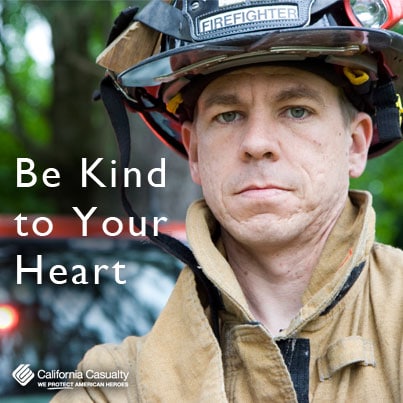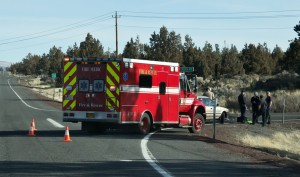by California Casualty | Firefighters, Health |
Few jobs are more stressful on a daily basis than being a firefighter. Not only must you deal with dangerous situations, but you’re also required to stay healthy and fit.
Whether you’re facing hectic hours and demanding duties that leave you tired at the end of the day, or spending long hours doing little but wait for a fire or medical emergency call, it’s essential for you take care of your body so it can keep performing well.
Diet and nutrition

As a firefighter, it’s critical that you pay attention to what you’re putting into your body. Obviously, nutrition directly affects physical performance, and as a first responder it’s vital that you’re always in shape and ready to act.
Here’s some advice for eating right:
- Get plenty of carbs. As someone who regularly engages in strenuous physical activity, it’s necessary for you to load up your body with complex carbohydrate-rich foods (such as fruits, veggies, whole-grain products, and cereals). These items fuel your muscles and enable you to enjoy better overall performance.
- Cut back on sugars. If you have a sweet tooth, that may turn out to be your greatest weakness. That’s because foods that are high in sugar slow you down and zap your energy, which you need when responding to a demanding situation.
- Start with a good breakfast. It’s wise to start off your day with a solid first meal. While breakfast is traditionally regarded as the first meal of the day, this could vary depending on your shift schedule. Whatever you first meal is, make it substantial and give yourself sufficient fuel to cover the duration of your shift.
Exercise and fitness

You might understand the importance of staying physically fit, but you likely lack a ton of spare time to work out. The good news is that it only requires a few minutes each day.
- Try high-intensity. There are generally two schools of thought when it comes to workouts. You should either do long, low-intensity workouts, or quick, high-intensity routines. When you’re restricted by time, the latter is extremely valuable. When you commit to high-intensity workout regimens, you realistically need only 20 to 30 minutes. Even for a firefighter with long shifts, that’s reasonable.
- Find a partner. There’s always power in numbers, and you can benefit substantially by having a workout partner. Ideally, this should be someone whoworks the same shifts and has the same fitness goals as you do. You can work with this individual to develop a detailed plan and stay accountable.
- Master the ten-minute routine. Since you never know what’s coming on any given day, it’s smart to save your energy and be prepared. However, that can result in a lot of wasted time if you aren’t careful. That’s where ten-minute routines come in handy. When you’re hanging around the station, try to perform a quick 10-minute workout every hour. These routines will keep you fit without draining your energy all at one time.
Sleep and relaxation

You mustn’t forget about sleep and relaxation. The only way to prepare yourself properly for your next shift is to take advantage of your down time and refuel.
- Find a schedule. If your shifts are sporadic, it can be challenging to establish any continuity — but a schedule is important. If you find yourself lying in bed without falling asleep, get up, do something, and then return to bed after 20 minutes. Agonizing over sleep will make it more difficult to nod off.
- Watch your diet. Avoid alcohol, caffeine, and excess fluids prior to going to sleep. Having too much in your system will affect your quality of sleep and may cause disruptions through the night.
Auto insurance for firefighters
At California Casualty, we offer superior auto insurance for firefighters. We do this because we believe our local first responders deserve reliable and effective protection, too.
For more information on our various polices, or for answers to your questions, please reach out and contact us today!
by California Casualty | Firefighters |

The life of a firefighter can be tough: long shifts, being awakened from a deep sleep with a pulse pounding alarm and having to deal with the aftermath of a terrible fire or crash.
This heart-healthy reminder is especially important for firefighters, many who think a heart attack can’t happen to them. Well, think again; working odd shifts, responding to fires and crashes and inhaling smoke takes its toll. Research by Harvard doctor Stefanos Kales found firefighters have one of the most stressful jobs in the United States and cardiovascular disease remains the primary on-duty and lifetime mortality risk. Kales found the risk of death from coronary heart disease significantly increased during the strenuous activity associated with fire suppression and during certain physical training activities. His conclusion: most fire departments lack fitness and health programs, putting firefighters at risk.
Warning Signs:
The Centers for Disease Control and Prevention cites three major risk factors for heart disease:
- High blood pressure
- High LDL cholesterol
- Smoking
These other medical conditions and lifestyle choices also put people at a higher risk:
- Diabetes
- Obesity and being over-weight
- Poor Diet
- Physical Inactivity
- Excessive alcohol use
Work stress can also take a toll on your heart. Firefighting veteran Linda Willing wrote a great piece for FireRescue1.com identifying nine sources of stress that firefighters need to be aware of:
- Shift work
- Sleep deprivation
- Inadequate training
- Gear and technical problems
- Bad Crews
- Malicious co-workers
- Inconsistent policies
- Poor leadership
- Bad or disturbing calls
Do you know the symptoms of a heart attack? Pay attention; here are the most prevalent warning signs:
- Chest pain or discomfort
- Upper body pain or discomfort in the arms, back, neck, jaw or upper stomach
- Shortness of breath
- Nausea, lightheadedness or cold sweats
And women are not immune to heart disease. While the incidence of heart related death rates have steadily declined for men, rates for women have fallen at a slower rate.
Recommendations:
A recent article in Cardiac Health offered these firefighter heart safety recommendations:
- Fire departments should provide mandatory preplacement and annual medical exams for all firefighters
- Fire departments should implement wellness and fitness programs to reduce risk factors from heart disease
- All firefighters should have annual physical performance evaluations
- Improved oxygen masks should be provided by fire departments
The National Volunteer Fire Council has created a Webpage dedicated to the healthy firefighter with information on healthy diet and exercise, lifestyle changes and training that can battle the incidence of heart related conditions. Here are some of the heart-healthy tips they recommend:
- Don’t smoke, and if you already do, try to quit – smokers are up to six times more likely to suffer a heart attack than non-smokers
- Aim for a healthy weight – overweight and obesity cause many preventable deaths
- Get moving and commit to regular exercise
- Eat for heart-health – a diet that is low in saturated fat, trans-fat, and cholesterol that includes whole grains, vegetables, and fruits
- Know your numbers – blood pressure, heart rate, glucose cholesterol (total, HDL, LDL, triglycerides)
Loving your heart will help restore energy, vitality and could prolong your career and your life. It’s not difficult; just tackle one or two heart-healthy tips at a time.
California Casualty has a long relationship with fire groups across the nation providing quality insurance with exclusive benefits not available to the general public. Get a policy review today at 1.800.800.9410 or at www.calcas.com/firefighters.
Sources for this article:
https://www.heart.org/HEARTORG/
https://www.cdc.gov/heartdisease/facts.htm
https://www.firerescue1.com/exclusives-1/articles/2100834-9-sources-of-firefighter-stress/
https://archive.sph.harvard.edu/press-releases/2007-releases/press03212007.html
https://www.cardiachealth.org/heart-disease-firefighters
https://www.healthy-firefighter.org/
by California Casualty | Firefighters, Health, Peace Officers |
As the first people on the scene during accidents, emergencies, and crimes, first responders are susceptible to experiencing strong emotional and physical reactions to stress. From sadness and fear to anxiety and anger, stressful emotions experienced on the clock are easily taken home at the end of your shift. Without an ongoing commitment to living a healthy, stress-reducing lifestyle, debilitating disorders, like chronic depression and PTSD, can emerge. Whether you’re an EMT, firefighter or police officer it’s important to take proactive measures to protect yourself from the destruction stress can cause.
Stress Management Isn’t Just Important – It’s Urgent!
The combination of mental and physical effects of stress can become unbearable, particularly for first responders who need to remain focused and clear-headed at work. Compared to other professionals, first responders are often last to seek help for work-related stress. According to the International Journal of Emergency Mental Health, first responders experience extreme discrimination from peers, including derogatory remarks, labelling, and loss of social status, when attempting to seek help. To effectively manage stress as a first responder, the first step is to learn about the two basic forms of stress you are likely to experience: stress during an incident and stress after an incident
Underestimating the duration of stress and its effects on mental and physical health is one of the biggest mistakes made by emergency personnel. Before you can begin to manage stress, it’s necessary to understand what stress looks like during and after a traumatic event. Emergency medical professionals, firefighters and police officers experience the following:
- Stress during an incident. Between denial, sorrow, fear, and numbness, many feelings can overwhelm you during an incident. Increased irritability, inability to concentrate, and irrational thoughts, are psychological signs of stress taking hold. Physically, stress may induce rapid heart rate, nausea, and shortness of breath.
- Stress after an incident. After experiencing a traumatic event, many first responders report an inability to sleep well, recurring nightmares, distractibility, and an inability to regulate emotions. Family conflicts, isolation, and chronic mental or physical disorders can occur as a result of unmanaged stress.
Learning to recognize the symptoms and consequences of stress is the first step in stress management. The next step is to learn to reduce stress.
8 Tips to Help First Responders Reduce Stress

Both on and off the job, you have the power of choice. Choose to stay at the top of your game by engaging in these 8 stress-reducing activities:
- Take time off when needed. Regardless of their role, first responders are an exceptional group of individuals committed to helping others and preserving safety. This dedication, while admirable, can quickly lead to a feeling of being overworked and highly stressed. After a particularly traumatic incident on the job, take time off to regroup and reinvest in yourself.
- Find a hobby. Essential for personal development, hobbies are a safe, healthy, and fun way to shift focus away from stressors and toward relaxation. From gardening or playing cards to painting or joining a club, participating in activities outside the workplace adds balance and serenity to your life.
- Exercise regularly. Keep up with the physical demands of your profession while maintaining a healthy weight by exercising regularly. Research indicates that exercise increases the body’s level of endorphins, resulting in improved mood, decreased irritability, and an enhanced ability to concentrate. Choose a fun fitness routine, like boxing or group classes, to remain motivated to exercise.
- Eat healthy foods. Expecting an uninterrupted lunch break as a first responder may seem farfetched, but that isn’t an excuse to load up on carbs, fat, sugar, and salt. In addition to negatively affecting your overall health, consuming unhealthy, processed, or fast foods can lead to increased irritability, low energy, and poor concentration. Instead, drink plenty of water and eat balanced meals that include whole grains, lean protein, and vegetables.
- Practice meditation or yoga. To battle the effects of stress, engage in meditation or stress-relieving exercises, like yoga. By combining stretches, breathing exercises, and bodily poses, yoga helps relieve anxiety, depression, and stress. Meditation alone is shown to help alleviate feelings of anxiety and depression, as well as reduce pain. According to the National Center for Complementary and Alternative Medicine, meditation is a technique used by nearly 10% of adults in the U.S.
- Start a journal. Communicating your thoughts and feelings is crucial to overcoming the experience of trauma. Even if you’re not ready to speak with a counselor, keeping a journal about your experiences allows self-expression without threat of discrimination. Simply writing to yourself will not only help get certain events off your mind, but will also enhance your communication skills.
- Seek counseling. Individual counseling can work wonders for first responders, even if they have not recently experienced trauma. By actively participating in counseling, emergency professionals receive a source of ongoing emotional support while working to manage stress. Working with a therapist to establish and maintain a healthy lifestyle increases your ability to appropriately cope with stress.
- Attend a support group. Participation in social events in a supportive setting is crucial for first responders, as it helps form bonds between those recovering from work-related trauma. Meeting with others who have experienced similar events is both an affirming and reassuring activity. After joining support groups, first responders are able to expand their social networks, focus on healthy relationships, and overcome work-related trauma.
Taking one or more of the above steps will help relieve stress now and in the future. With first responders considered high risk for PTSD and depression, investing in your physical and mental health now is important for ensuring you have an enjoyable future.
The biggest obstacle to getting help is feeling confident when asking for help that the help is confidential. Here is a list of resources. Some are specific to Fire/EMS; some are specific to Law Enforcement. All are resources for confidential help.
American Foundation for Suicide Prevention – Resource for understanding warning signs of suicide and how to get help for yourself or someone else.
Centers for Disease Control and Prevention – Resources for individuals affected by a disaster – including first responders.
National Center for PTSD – Good resource for anyone who has experienced trauma.
National Institute of Mental Health – Good resource for a wide variety of mental health information.
National Suicide Prevention Lifeline – This is a hotline for anyone in crisis or to get help form someone in crisis. You do not need to be suicidal to call this line. They are there to listen and provide resources without judging. Afraid to call? Use the chat function from a computer or mobile device. Either way, you can remain anonymous!
Sites Specific to Fire/EMS:
All Hands Working – Organization dedicated to providing help to firefighters on and off duty.
Firefighter Behavioral Health Alliance – Non-profit organization developed to help educate firefighters and EMS about mental health on the job.
Helping Heroes – List of behavioral health resources specific to firefighters from National Fallen Firefighters Foundation.
Share the Load Support Program for Fire and EMS – Focusing on the mental well-being of firefighters and EMS.
Sites Specific to Law Enforcement:
Badge of Life – Site is specific to law enforcement and suicide prevention.
CopsAlive.com – Information, strategies and tools to help cops plan for happy, healthy and successful careers, relationships and lives.
Tears of a Cop – Site dedicated to stopping officer suicide and providing resources for PTSD.
Asking for help is the hardest thing to do! Sometimes even “heroes” need help. Please reach out if you or someone you know is struggling.
This article is furnished by California Casualty, providing auto and home insurance to educators, law enforcement officers, firefighters and nurses. Get a quote at 1.800.800.9410 or www.calcas.com.
by California Casualty | Firefighters |
October is almost over but the risk for home fires increases as the temperatures drop. To finish out October we want to examine your preparedness.
Did you know?
- On average, 7 people die every day from a home fire
- On average, 36 people suffer injuries as a result of home fires every day
- Over $7 billion in property damage occurs every year from home fires


Families can take 3 easy steps to increase their chances of surviving a home fire:
For helpful tips on how to develop your escape plan and other fire safety information visit the Red Cross webpage at: https://www.redcross.org/prepare/location/home-family/prevent-home-fires.
This article is furnished by California Casualty, providing auto and home insurance to educators, law enforcement officers, firefighters and nurses. Get a quote at 1.800.800.9410 or www.calcas.com.
by California Casualty | Firefighters |

Technological advancements have made streamlining processes and optimizing operations possible universally, with the impact affecting the largest corporations all the way down to our daily lives. One area where the application of the latest technology is evident is in public safety, and in particular the help it provides first responders. Here’s a look at the benefits that technology provides for emergency responders — from greater intelligence to better communications.
Personnel Management and Automatic Vehicle Location Systems
Personnel systems and Automatic Vehicle Location (AVL) systems give first responders an instantaneous view of their personnel, vehicles and medical equipment. Through the use of technology, a real-time status of the entire operation allows first responders to track down equipment, make decisions on dispatching personnel and know immediately if any areas are understaffed.
Intelligence and Computer-Aided Dispatch
A main theme behind the implementation of technology in the vehicles and dispatch offices of EMTs and first responders is eliminating paperwork. When first responders are bogged down in paperwork, they cannot properly focus on their efforts to provide response to emergencies quickly and effectively. Computer-Aided Dispatch (CAD) systems digitize the act of managing incidents, allowing individuals to enter them into a management system from dispatch or from vehicle-mounted computers.
Within this system, there is a running account of what’s happening, enabling quick decisions. This data can also be pushed into a records management system (RMS). With an archive of events, CAD systems can run reports and first responders can leverage the intelligence gleaned for a more effective response strategy in the future.
Electronic Patient Care Reporting
Electronic Patient Care Reporting (ePCR) is a reporting and filing system for first responders for managing the medical side of the operation, rather than the logistical side. No longer do emergency personnel have to worry about misplacing or throwing out important medical records. These systems are also more secure than a paper filing system and allow personnel to quickly file reports and return to work immediately.
Mass Notification Systems
The prevalence of cell phones and social media have given first responders an advantage when it comes to receiving calls, including civilian distress applications. Civilian distress applications can be downloaded onto a smartphone, and used to notify the public, law enforcement, or medical personnel of an event. Early responders can utilize these apps like they are accepting 911 calls. By doing so, they stand to reduce call qualification time by using GPS to pinpoint exactly where the distress call is coming from. The caller’s identity can also be determined, further reducing time to intervention.
Cell phone prevalence also brings with it social media, as many smartphone owners regularly use their favorite social media apps on their phones. Monitoring social media can give early responders information on events, enabling the proper planning and decision-making on the go. Additionally, social media acts as a useful platform for public safety announcements.
Technology in the right hands is a wonderful thing, and it’s even better when technology is put to good use. With advances in technology in public health, first responders are leveraging their intelligence and improving communications, which is leading to better response and, overall, more lives saved.
Author Bio:
Cheryl Bikowski is Marketing Communications Supervisor of Gamber-Johnson in Stevens Point, WI. Gamber-Johnson is a leading supplier of vehicle docking stations and vehicle computer mounts and is a member of the Leggett & Platt Commercial Vehicle Products (CVP) Group.
by California Casualty | Firefighters |

Driving is part of nearly every call, and medical emergencies do not stop happening on account of bad driving conditions. When winter rolls around, most people can leave the car in the garage and stay off the roads. As an EMT you don’t have that luxury, and there are certain precautions and considerations to take. Here are some tips on how to stay safe on the road as a paramedic, from keeping the vehicle in good condition to reducing your speed.
At the station
When the temperatures are dropping and you hear that first winter forecast of the season, preparing your vehicle should be your first move. If you drive a vehicle that belongs to a department, the tires are usually well maintained, and the tread depth should be sufficient for winter driving. Even so, it certainly doesn’t hurt to check. If you are a volunteer, then it is your responsibility to check the inflation and tread depth of the tires on your vehicle.
Check that you have the appropriate level of fluids that are specifically meant to combat freezing temperature, namely antifreeze. Also, your windshield wiper fluid should be rated not to freeze, so make sure you’ve got enough. You’d hate to be flying blind out there.
Speaking of your windshield wipers and your windshield, make sure your wiper blades are soft, pliable and in good condition. Visibility is greatly reduced in inclement weather, so remember to clean your windows and windshield thoroughly between calls. Ice, snow and salt can all accumulate over time, so make sure that your headlights and emergency lights are cleared off. This ensures other motorists can see you when you’re rushing to respond. Snow and ice can also pack into your siren cones, so clear those out to make sure your siren is at full volume.
On the road
Getting your vehicle properly prepared to face the harsh environment in the event of a call is only half the battle. The rest takes place when you’re actually driving, and a main factor is ice. You don’t always see ice, so an important thing to do when you’re responding to a call is to reduce your speed and increase your stopping distance. You may tend to ignore your speed while focusing to respond as fast as possible, but you may be putting yourself and other motorists in danger.
Black ice can show up anywhere; so remember that just because you can see the road does not mean it is free of ice. Remember that bridges and overpasses freeze before the rest of the road does, so be especially careful when your route takes you over one. Ice isn’t always the culprit in winter driving, so watch out for snow and slush as well. Snow and slush make roads slippery, and you can get stuck in particularly deep snow. Don’t drive into deep snow unless you are driving a vehicle that is adequately suited for it.
Above all, be careful! With a proactive attitude and an awareness of road conditions, you’ll be able to carefully and quickly respond to any emergency calls during the winter.
Author Bio:
Cheryl Bikowski is Marketing Communications Supervisor of Gamber-Johnson in Stevens Point, WI. Gamber-Johnson is a leading supplier of vehicle computer mounts and vehicle docking stations and is a member of the Leggett & Platt Commercial Vehicle Products (CVP) Group.









